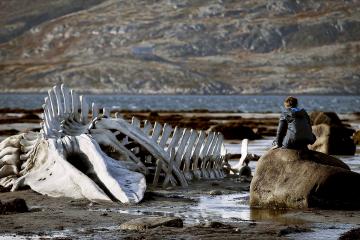'Leviathan' delves into the stark realities of life in a Russian fishing town
By Barry Paris / Pittsburgh Post-Gazette
Everybody and everything is vodka-saturated in “Leviathan,” Russia’s Oscar-nominated foreign film entry for 2015.
Celebrating? Mourning? Fighting? Making love? Discussing legal strategy around the kitchen table? Whatever the occasion, “Let’s drink!” is the invocation for these folks, who regularly put away something close to a Smirnoff-Stoli warehouse. They and their inebriation and their situation have humorous moments — but mostly not, in director-writer Andrey Zvyagintsev’s bitterly cynical reworking of the Book of Job.
It takes place in a once-thriving, now-crumbling northwest Russian fishing town on the Barents Sea, where Kolya (Aleksey Serebryakov), his young wife, Lilya (Elena Liadova), and his sullen teenage son, Roma (Sergey Pokhodaev), from a previous marriage live in a sprawling seaside property that has been owned by Kolya’s family for generations.
But these days it has suddenly become prime real estate, and the local mayor, a corrupt thug named Vadim (Roman Madianov), wants to expropriate it for a lucrative development scheme.
What to do? Kolya summons his old Army buddy Dmitri (Vladimir Vdovichenkov), now a hot-shot Moscow lawyer, to defend his land and collect dirt on the mayor. They win the first battle or two...if not the war.
“Leviathan’s” wonderful title references three things: (1) the sea monster in the biblical Job story, (2) the skeleton of a beached whale in Kolya’s seaside village, and (3) Thomas Hobbes’ seminal book — written in 1651 during the English Civil War — with its ominous argument for constitutional order in the form of a social contract between commoners and an absolute sovereign.
Hobbes saw the state as Leviathan, indeed — a monster created by man to prevent “the war of all against all.” We’re all born into a religious “state” of original sin and a government “state” — neither of which we chose or agreed to. The (theoretical) social deal says we get security in exchange for freedom. The problem comes when we and the system come into conflict — a longtime Dostoyevskian theme in Russian and worldwide literature.
Director Zvyagintsev masterfully renders both the humor and the horror of this dilemma. In one scene early on, a judge rattles out the words of her ruling (against Kolya, in favor of Mayor Vadim) faster than the final side-effects disclaimer of a Viagra ad. In another extraordinary scene — a “birthday shooting party” by the sea — the wives cook while the menfolk, drunk and armed to the teeth, fire at targets that include framed portraits of former Soviet leaders.
“Leviathan” is graced by the wrenchingly naturalistic performances of characters whose relationships evolve in subtly significant ways: Dmitri and Lilya sleep together; Lilya’s conflicted desperation mounts; spitfire Roma spends nights hanging out with pals in the ruins of an old church, learning how to drink. Father and son have a mutually tough, rough love.
“Will you ever stop drinking?” Roma asks.
“Tomorrow,” Kolya replies.
Their no-nonsense neighbor Angela issues an order: “Don’t drink so much!”
“I won’t,” Kolya promises.
“Good,” she answers — and then pours hefty drinks all around.
Mr. Zvyagintsev’s powerful voice is fueled by his angry, sardonic contempt for the soul-crushing corruption that infects Russian culture — and a helluva lot of others. His previous masterwork “Elena” (2011) was a similarly provocative film-noir tale of Putin-era Russia in which a wealthy technocrat leaves his fortune to a spoiled-brat daughter — played by the same Elena Liadova who steals the show here.
Both gripping, downbeat films take place in the moral vacuum of Russia’s Cowardly New World, where the dubious gifts of capitalism have yet to trickle down.
Mr. Zvyagintsev points his finger at everybody — but especially the unholy alliance between the Russian Orthodox church and the political bureaucracy.
The sleazy mayor and his local priest enjoy a very useful, amicable relationship. One day over tea, Vadim begins, “What happened was — ”
The priest cuts him off: “Don’t reveal anything to me. You’re not at confession. You and I may be working for the same cause. But you’ve got your territory, and I’ve got mine.”
Gorgeous, solemn Philip Glass music opens and closes the film. Otherwise, silence enhances all 140 minutes of its gritty realism. This fascinating if difficult director never caters to his viewers. Neither does his terrific, stark cinematography of dead boats, dead buildings, dead whales — skeletal remains of all — with a final bulldozer chomping away, like some Jurassic Park dinosaur, at Kolya’s beautiful old home.
We’re left, as we began, with waves smashing against rocks, chipping away at them and at the endless suffering of simple folks like Kolya.
Even Job got a better deal. Nowadays, there are countless tales like Kolya’s, in and out of Russia. All ages and habitations are ripe for the wrecking.
(In Russian with English subtitles. Opens today at the Harris Theater, Downtown, through Wednesday only.)
Post-Gazette film critic emeritus Barry Paris: parispg48@aol.com.





